(proposal for a book and website, in progress)
WHY DEMOCRACY?
Ever since the invention of our current form of
social structure, some 10,000 years ago,
there has been one constant characteristic that shows up in
all societies
as they've come and gone throughout the centuries...
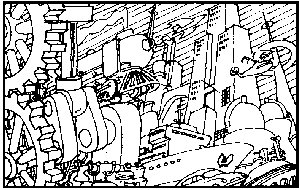
the social power structure
has been designed
so that it works to the benefit of a relatively small group of people
that make up that society.
'THE RULING ELITE'
This small percentage of people have been characterized by
the functions they perform within the society.
They can be classified into several groups that are intimately
interconnected and dependent on each other,
and as the name implies,
they are the ones that make the rules by which the rest of society
must live.
Roughly these are:
1- THE WARRIORS
The people who in earlier times were the hunters and defenders
of the clan,
but somewhere along the line became ruthless enough to subdue, by the
force of arms,
whatever opposition
they to their desire to acquire
property and control people.
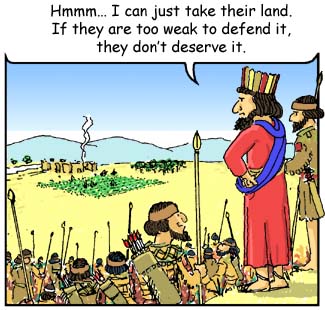
Although at different times and in different
societies, the warrior has been a temporary occupation
they have always been the enforcing tool of the rule makers, within
or outside of their own society ,
with plenty of incentives to attract suitable candidates.
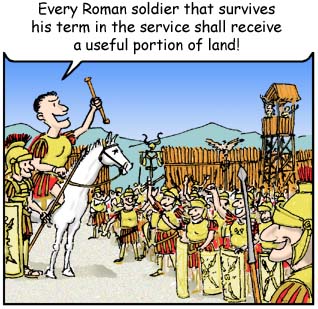
Combat is inherently an antisocial activity,
it's goal is to impose someone's will on others.
It encourages it's practitioners to rid themselves of all social
constraints,
and all kinds of inhumane acts have been the standard of behavior.
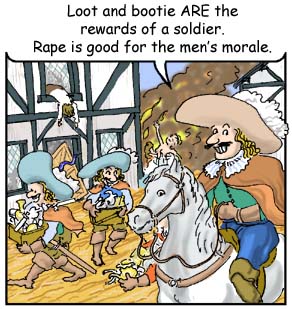
2- THE ROYALTY
Originally, in Sumeria, when
there were community wide problems,
a 'big man' was elected to handle, that is,
coordinate the actions needed to solve the emergency.
At one point, one of these men decided not to step down.
He became the first King of Kish.
This started the process going...
and soon after, they had to come up with some "rational" reason as to
why this was so.
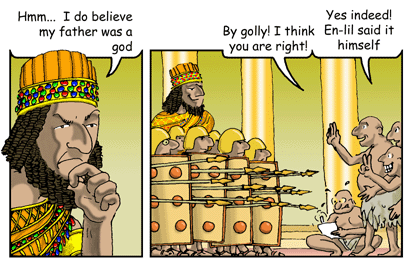
The royalty was a development
of the warriors and their families, who convinced the rest of society
(and themselves),
that they were somehow endowed by 'higher powers' to rule over and 'guide' the common
people.
This, of course,
was achieved through
the exercise of power over life and death.
The willing cooperation of the
religious leaders has been a necessary element to maintain its power.
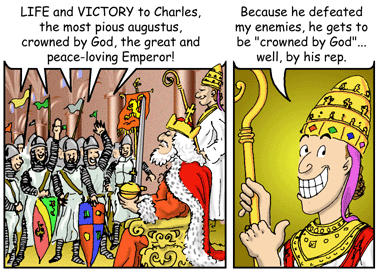
3- THE PRIESTHOOD
The People who claimed knowledge of the 'will of God', gave legitimacy
to the rule of the 'big man',
and counseled the common people to obedience and submission.
Sumeria did not have much in the way of rocks for construction,
but they did have a lot of dirt, thus, the manufacturing of
mud bricks
became a RELIGIOUS DUTY.
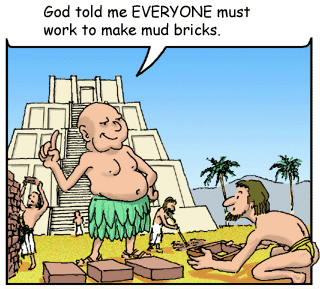
The Israeli priesthood required a tithing for their services,
thus, ensuring God's favors,
or at least their advise to obtain such favors.
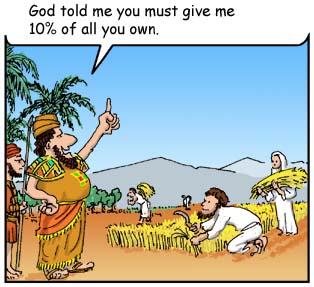
The Aztec priests convinced their people, both royalty and commoners
that their god required human sacrifices to acquire their blessings.
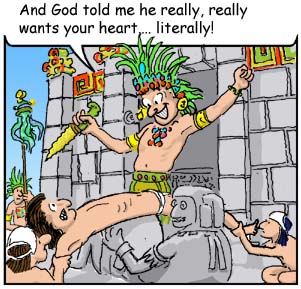
... and after the Middle Ages
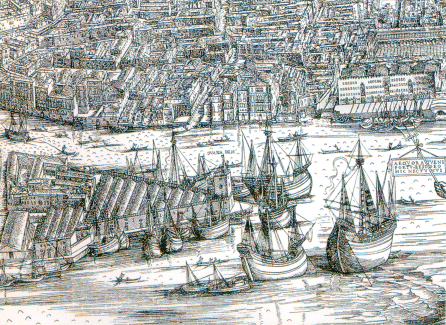
THE MERCHANTS
As technology brought a change in the centers of wealth,
changing the sources of economy
from farming to manufacturing and commerce,
the rulers became dependent on the wealth of these groups, the
merchants, but more specifically,
the banks, that newfangled invention of the crusading knights,
(drawing of knight in a castle room full
of treasure)
after all, it costs a lot of money to
maintain a fighting force to use in their dreams of pride and glory.
and finally,
(drawing 'da Vinci' look-alike in ivory tower)
THE INTELLECTUALS
the group of people who come up with the intellectual and
supposedly 'rational' justification for whatever the ruling elite
decide to do.
The history of the "civilized" world, that
is, the world AFTER the invention
of writing,
has been one of constant wars
between different groups of people.
So much so that we tend to think that THAT
is simply the human condition.
There will ALWAYS be wars between people.

The population was looked at as brutish masses
that needed to be controlled
by a stern father figure.. or it's equivalent.
(drawings of Caesar, a
Pope, a King as father figures)
or, at least that was the excuse given to
justify the rulers control.
However..
During the 17th and 18th Centuries,
as the 'Age of Enlightenment'
came into full swing,
when people began to look
at Nature with their own eyes,
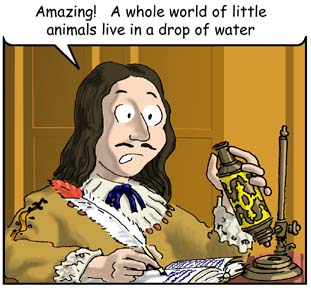
to get their own ideas of what is real and what is not,
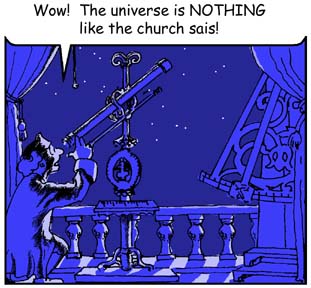
when they began to believe that they could
find 'the will of God' written
large in the mechanics of Nature,
and began to abandon the blind
belief and literal interpretation of the sacred books,
(drawing of cuban indian inviting a spaniard to
smoke a cigar)
after explorer's reports began
coming back to Europe
about native tribes living
in complete peace and harmony with their neighbors
in the newly discovered continent
of America,
there arose an idea..
That the root of the all too visible social
ills was NOT due to the inherent evil of the individual,
as they'd been told by their
religious, political and intellectual leaders,
but the SOCIAL STRUCTURE itself
was the cause of the problem.
It took a long time and many thinkers to develop
this concept,
but among the carriers of
these ideas we find:

John Locke (1632-1704)
"Man survives
by reason, and in order to do so, he must be free from the initiation
of force. Society can be greatly beneficial to the individual because
of mutual protection, division of labor, and economies of scale. But it
is only beneficial to the extent that the individual is still free to
act and survive according to his own reason."
"Every man has a property
in his own person: this no body has any right to but himself. The
labor of his body, and the work of his hands, we may say, are properly
his."
John Locke, "The
Second Treatise On Civil Government"

Voltaire (1694-1778)
ORDINARILY there is no comparison between the crimes of the great who are
always ambitious, and the crimes of the people who always want, and can want
only liberty and equality. These two sentiments, Liberty and Equality, do
not lead direct to calumny, rapine, assassination, poisoning, the devastation
of one's neighbors' lands, etc.; but ambitious might and the mania for power
plunge into all these crimes whatever be the time, whatever be the place. Popular government is in itself, therefore, less iniquitous, less abominable
than despotic power.
(The Philosophical
Dictionary - Democracy)
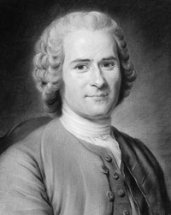
Jean-Jacques Rousseau (1712-1778)
Man is born free; and everywhere
he is in chains. One thinks himself the master of others, and still
remains a greater slave than they. How did this change come about? I
do not know. What can make it legitimate? That question I think I can
answer. (Social Contract)
THE most ancient of all
societies, and the only one that is natural, is the family: and even
so the children remain attached to the father only so long as they
need him for their preservation. As soon as this need ceases, the natural
bond is dissolved. The children, released from the obedience they owed
to the father, and the father, released from the care he owed his
children, return equally to independence. If they remain united, they
continue so no longer naturally, but voluntarily; and the family itself
is then maintained only by convention. (Social Contract)

Benjamin Franklin (1706-1790)
(quote )
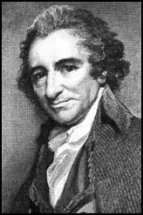
Tom Paine (1737 -1809)
What is government more than the management of the affairs of a Nation?
It is not, and from its nature cannot be, the property of any
particular man or family, but of the whole community,
at whose expense it is supported; and though by force
or contrivance it has been usurped into an inheritance,
the usurpation cannot alter the right of things.
It is inhuman
to talk of a million sterling a year, paid out of the public
taxes of any country, for the support of any individual, while
thousands who are forced to contribute thereto, are pining with
want, and struggling with misery. What is called the splendor of
a throne is no other than the corruption of the state. It is
made up of a band of parasites, living in luxurious indolence,
out of the public taxes. (Rights of Man, 1791)

Thomas Jefferson (1743-1826)
"The criminal attempts of private individuals to decide for their country
the question of peace or war, by commencing active and unauthorized hostilities,
should be promptly and efficaciously suppressed." --Thomas Jefferson: 6th
Annual Message, 1806. ME 3:416
"A free people [claim] their rights as derived from the laws of nature,
and not as the gift of their chief magistrate." --Thomas Jefferson: Rights
of British America, 1774. ME 1:209, Papers 1:134
"Under the law of nature, all men are born free, every one comes into
the world with a right to his own person, which includes the liberty of moving
and using it at his own will. This is what is called personal liberty, and
is given him by the Author of nature, because necessary for his own sustenance." --Thomas Jefferson: Legal Argument, 1770. FE 1:376
These are the ideas that gave birth to that
great experiment we call
The United
States of America
the birthplace of modern Democracy
<END OF FIRST SECTION>
WHAT IS TRUE?
These ideas came about from the observations of some of the brightest
minds of the time
and the ideas took a long time to gain a predominant place in the imagination
of the world's populations
but by the end of the 20th Century there has been an overwhelming cry for
more democracy in most parts of the world.
It has been said that "Democracies do not start wars"
But did those philosophers of the "Enlightenment" get
it right?
Is it true that "the people" are basically good and will choose a path of
peace and friendship if given a chance?
Or were the ruling elite correct and mankind is basically
barbaric with the need for a strong "guiding hand"?
After all, the conclusions of the "Enlightenment" came about from very limited
observations...
perhaps their view of "the Noble Savage" was a romanticizing of an equally
barbaric and ruthless people.
Fortunately for us, the "Scientific Method" has been digging deeper
and wider into all areas of knowledge
and now we can have a sound base from which we can confidently assert that
these ideas are correct.


















